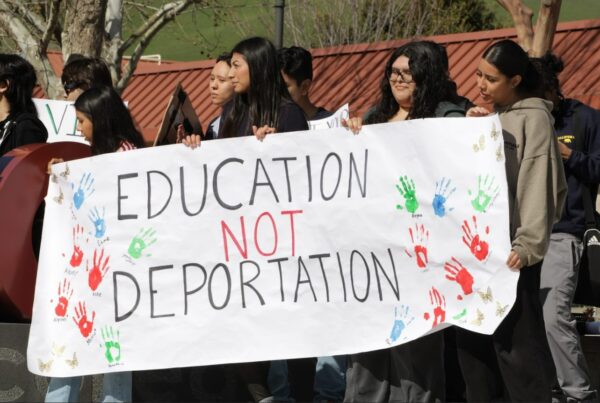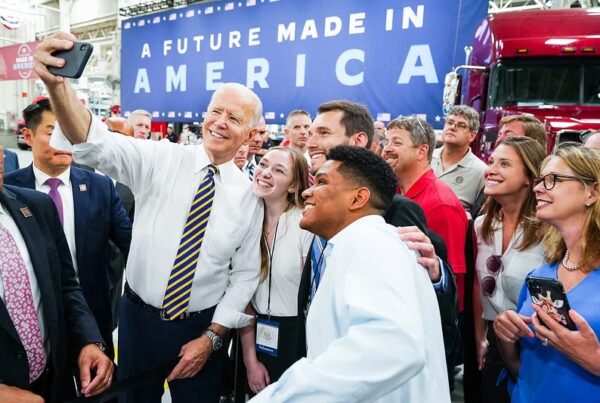By Vladimir Medenica
October 26, 2020
As the presidential election on November 3rd draws near, Latinx Americans have received renewed attention from both pundits and candidates running for office – and for good reason. Latinx Americans account for over 59% of the total population growth in the United States since 2000. This election marks the first time that Americans who self identify as Latinx are expected to be the largest share of the electorate behind non-Hispanic whites.
With a median age of 30 years old for Latinx people overall and 19 for those born in the U.S., the views of young Latinx adults have the power to shape national and local politics unlike ever before. And in important battleground states like Florida, Arizona, Texas, Nevada, and North Carolina, the presidential campaigns have started to pay attention.
So, what are the issues that young Latinx adults care about? According to the most recent GenForward Survey, a plurality (28%) of Latinx Americans name the coronavirus pandemic as the most important problem facing the country with racism and police brutality named second (20%) among those between the ages of 18 and 36. Among those under 25, racism and police brutality rank first (27%).[1]
Joe Biden has a clear edge over Donald Trump on these issues. Over half (54%) of Latinx Americans under 36 years old say that they trust Biden to handle the coronavirus pandemic while only 15% report that they trust Trump over Biden. When it comes to protests over racism, an even greater majority (61%) point to Biden as the candidate they trust compared to 14% Latinx Americans who are more likely to trust Trump.
Latinx Americans have little reason to trust Trump on either issue. Latinx Americans have acutely felt the effects of Covid-19, both physically and economically, and have become targets of law enforcement raids across the country. After launching his candidacy for president in 2015 by proclaiming that Mexico was sending rapists and criminals to the United States, Trump built his campaign on an anti-immigrant platform and has tried to follow through on his promises by tapping into the power and reach of the criminal justice system. Since taking office in 2017, the Trump administration has increased immigration enforcement efforts, criminalized asylum-seekers, and forcibly separated thousands of children from their parents at the border, hundreds of which remain “lost”. These actions have created a climate of anxiety and fear among many Latinx Americans and decreased trust in the police.
In addition to their awareness of the police as a tool for surveilling immigrant populations, Latinx Americans, as all Americans, have laid witness to unrelenting acts of police violence and anti-Blackness across the U.S. Against a backdrop of state overreach, police violence, and overt white supremacy, young Latinx adults, many of whom identify as Afro-Latinx, are calling for action on racism in America and a re-imagining of policing. Like many other of their peers across categories of race and ethnicity, a large majority (76%) of Latinx respondents in our GenForward survey strongly or somewhat support creating a new agency of first responders that specialize in de-escalation of violence, providing mental health support, and other social services that would take over these responsibilities from the police.
While recent polls of older Latinx Americans suggest that there remains considerable support for Trump among the Latinx population overall, and especially men, our findings nevertheless suggest that there exists a stark divide between older and younger Latinx Americans in the U.S. and that Trump is at a huge disadvantage with a population that will make the difference in crucial states not just in this election, but in many more to come. The question for this election is whether Biden and his team can capitalize on their advantage and mobilize young Latinx voters to get to the polls.
The GenForward Survey is associated with the University of Chicago. August 2020 responses were collected July 24th, 2020 through August 6th, 2020, among a nationally-representative sample of 3,115 young adults between the ages of 18 and 36. The overall margin of sampling error is +/- 2.54%.
Vladimir Medenica is Assistant Professor in the Department of Political Science & International Relations and affiliated faculty member of the Center for Political Communication and the Program in Latin American and Iberian Studies at the University of Delaware. His work focuses broadly on the relationship between social identity and systemic inequities in political participation and representation in American politics and has appeared in peer-reviewed journals including Political Research Quarterly, The Journal of Race, Ethnicity, and Politics, and The Forum, as well as popular outlets like The Washington Post and The Hill. Learn more about Vladimir & the GenForward researchers here.
More Perspectives



